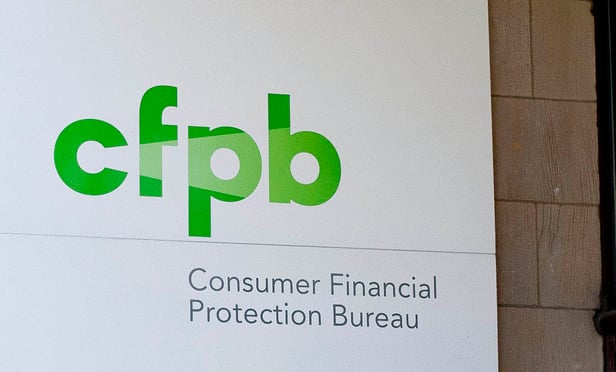 Consumer Financial Protection Bureau building in Washington, D.C. Photo by Diego M. Radzinschi
Consumer Financial Protection Bureau building in Washington, D.C. Photo by Diego M. Radzinschi
State attorneys general are pushing the CFPB to reconsider abandoning enforcement of the Military Lending Act and to amend its plans to allow financial institutions to test model consumer disclosures.
Some 33 Democratic and Republican attorneys general accused the agency of abandoning its statutory responsibility to servicemembers, while 12 Democratic attorneys general said the model disclosure proposal could allow companies to decrease disclosures to consumers.
Recommended For You
The pressure comes as Acting CFPB Director Mick Mulvaney puts his own imprint on the agency, following the resignation of former CFPB Director Richard Cordray. Cordray, an advocate of strict regulation, is the Democratic nominee for Ohio governor.
The CFPB, under Mulvaney, has been much more pro-business than in the past.
In a letter on the MLA, the attorneys general wrote, "We believe that the CFPB would be failing to abide by its statutorily mandated duty to enforce the MLA by restrictively interpreting its examination authority to preclude reviewing lenders' compliance with the MLA."
They added that such a move would significantly harm servicemembers, many of whom recently reached the age of majority and may have little experience in managing their own finances.
In saying they intended to re-examine many bureau activities, agency officials said they may not have the statutory authority to enforce the law as strictly as Cordray did.
The attorneys general disputed that notion.
Credit union trade groups have said that the CFPB should end examining credit union compliance with the Military Lending Act but should continue to root out unscrupulous business that prey on military families.
Meanwhile, 12 Democratic attorneys general say they are concerned that the CFPB's proposal to allow financial institutions to test model disclosures could simply be used as a regulatory loophole to allow financial institutions to abandon needed consumer protection.
"The proposed Disclosure Sandbox allows the Bureau to broadly grant waivers for any specified reason, with minimal to no consumer safeguards, without transparency, and for potentially indefinite periods of time," the attorneys general wrote.
And they said that Dodd-Frank does not permit trial disclosures that may be cos-effective, but do not protect consumers.
They added that the bureau cannot bar state officials from enforcing state law.
The bureau said that in the past, the agency encouraged such innovation, but the constraints included in the application process for approval were so poor that not a single application was approved. The CFPB is proposing the streamline the application process.
"The Bureau's proposed review will now focus on the quality and persuasiveness of the application, especially the extent to which the trial disclosures are likely to be an improvement over existing disclosures, and the extent to which the testing program mitigates risks to consumers," the agency said.
On a separate issue, Democratic members of the New York congressional delegation, and members of the New York City Council's Black, Latino and Asian caucuses are calling for Mulvaney to fire agency official Eric Blankenstein.
Blankenstein, who is in charge of supervising fair lending issues at the agency, has acknowledged writing racist blog posts while in college. Mulvaney recently said that bureau employees are entitled to do what they want on their own time.
Subsequently, the agency announced that the CFPB's Inspector General will investigate the situation.
© 2025 ALM Global, LLC, All Rights Reserved. Request academic re-use from www.copyright.com. All other uses, submit a request to [email protected]. For more information visit Asset & Logo Licensing.






